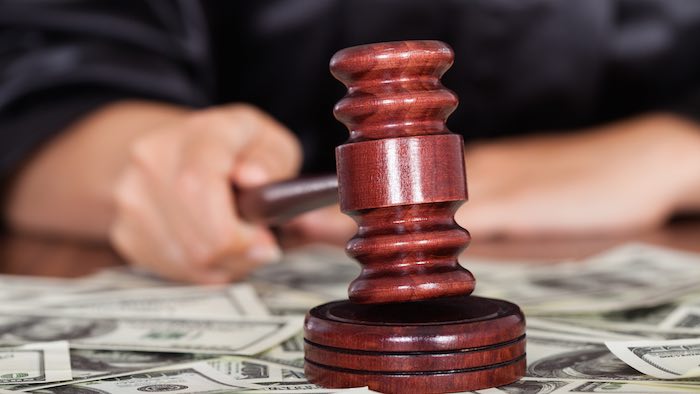As part of my continued work to protect the rights of independent inventors, last month I filed an amicus brief (“friend of the court”) with the U.S. Court of Appeals for the Federal Court in the case Halo v. Pulse, in which I urge the court to allow judges to award enhanced damages in favor of the patent owner.
In the case of Halo v. Pulse, the plaintiff, a patent owner, had offered the defendant a license for the patent, but the defendant not only rejected the offer but it refused to negotiate, provided no reason for its rejection, obtained no legal opinion of invalidity or non-infringement, and continued to use the patented invention for years. When the plaintiff finally brought the case to court and won, the defendant was only ordered to pay only a “reasonable royalty,” which is no more than the original license that the plaintiff offered. In cases where the infringer has “not acted in good faith,” or has caused “unnecessary expense and injury” to the patent owner, the judge should have the power to increase the damages owed to the patent owner beyond those that would have been obtained in a license agreement that the defendant refused in the first place.
Indeed, infringers should not be able to arrogantly and recklessly violate patents for years but ultimately pay only the same amount they would have paid the patent owner for a license in the first place. Currently, however, that is the situation that exists, because an infringer can avoid being stuck with enhanced damages if the infringer’s attorneys, for the first time in the litigation, raise a newly-devised (but ultimately incorrect) argument that the patent is invalid or not infringed, even if this was not the actual reason why the infringer refused to take a license years earlier.
My amicus brief points out the dire economic consequences to inventors and the U.S. economy if the patent rights of individual inventors and small businesses are not respected and protected against predatory infringers who will not respect their rights.
The brief also argues that judges should have the flexibility to increase damages based on “aggravated circumstances,” “unnecessary expense and trouble” and “any special inconvenience” suffered by the patent owner—terms that come straight from opinions of the U.S. Supreme Court in early patent cases that properly respected the rights of patent owners.
To read the entire Amicus Brief, click here.

![[IPWatchdog Logo]](https://ipwatchdog.com/wp-content/themes/IPWatchdog%20-%202023/assets/images/temp/logo-small@2x.png)



![[Advertisement]](https://ipwatchdog.com/wp-content/uploads/2024/04/Patent-Litigation-Masters-2024-sidebar-early-bird-ends-Apr-21-last-chance-700x500-1.jpg)

![[Advertisement]](https://ipwatchdog.com/wp-content/uploads/2021/12/WEBINAR-336-x-280-px.png)
![[Advertisement]](https://ipwatchdog.com/wp-content/uploads/2021/12/2021-Patent-Practice-on-Demand-recorded-Feb-2021-336-x-280.jpg)
![[Advertisement]](https://ipwatchdog.com/wp-content/uploads/2021/12/Ad-4-The-Invent-Patent-System™.png)







Join the Discussion
7 comments so far.
Anon
February 1, 2015 11:10 amGene,
Let’s give Mark the benefit of the doubt and see if he is willing to come back and provide a more reasoned (and rational) statement.
If he does not do so, then chances are good that he merely meant to “troll,” and that his viewpoint is as self-reflecting as I noted above (which actually detracts from the stand that he wishes to represent).
Gene Quinn
January 31, 2015 05:28 pmMark-
First, in the future, if you want to comment here please keep your comments intellectually honest. Please also refrain from non-informing and clearly inflammatory comments that convey no substantive meaning. There are plenty of places where this brand of comment is allowed and encouraged on the Internet. IPWatchdog is not one of those places.
Second, obviously you know absolutely nothing about the industry, or patent law, because the arguments raised in this article are not at all ridiculous. People can have differing views on the substantive issue, but to call this article and argument ridiculous is rather idiotic.
Finally, whether you want to admit it or not, large companies do refuse to enter into licensing negotiations and instead choose to infringe. They fight a war of attrition if litigation arises. It is fundamentally unfair for a patent owner to receive only what they should have been paid 5 or 10 years earlier without the need to litigation. But whether that is willful infringement is open for debate. Having said that, everyone in the industry who is both honest and informed knows that there is at least intentional infringement under the guise of the efficient infringement theory.
So, I guess what I’m saying is that you either don’t know what you are talking, you are uninformed, or you are terribly dishonest.
-Gene
Anon
January 31, 2015 08:57 amMark,
Your self-fulfilling edict is spot on: but only for comment 4.
Maybe (just maybe), you ought to add something intelligent to your post in order to explain your feelings.
Mark Hrozenchik
January 31, 2015 07:28 amRidiculous argument. Total nonsense. Don’t waste your time reading this rant.
Ken
January 30, 2015 06:26 pmExcellent points made in your amicus brief! Great Supreme Court cases showing the broad discretion courts have to award triple damages under the similarly-worded predecessor statute of 1836. E.g., Teese v. Huntingdon, 64 U.S. 2, 9 (1860) (“[I]f, in the opinion of the court, the defendant has not acted in good faith, or has caused unnecessary expense and injury to the plaintiff, the court may render judgment for a larger sum, not exceeding three times the amount of the verdict.”); Tilghman v. Proctor, 125 U.S. 136, 143-44 (1888) (“[T]he court may, whenever the circumstances of the case appear to require it, inflict vindictive or punitive damages, by rendering judgment for not more than thrice the amount of the verdict.”).
Anon
January 30, 2015 11:25 amFully agree.
A stronger patent right brings more certainty to the market and to the players in the market, generating respect for the power of the patent right.
The widespread and near continuous philosophical battle against patents only encourages more disrespect – and the concurrent more flagrant disregard of the patent system overall.
Joachim Martillo
January 30, 2015 10:46 amDefinitely something that should be on the agenda for patent reform.